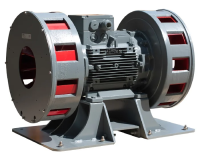Large Motorised Sirens: Difference between revisions
ArxCyberwolf (talk | contribs) (Moved page over from the CDS Wiki.) |
(Add image from CDS) |
||
| Line 1: | Line 1: | ||
{{Infobox siren|title=Klaxon General-Purpose Series|company=Klaxon Signals Ltd.|produced=1989?-Present|type=[[Omnidirectional]] [[Electromechanical]]|output=120 dB @ 100 ft/30 m|hz=50}}The Klaxon '''General-Purpose series (GP)''' is a series of sirens manufactured by British company Klaxon Signals Ltd. The series was introduced to the market in the early 1940's and is still being manufactured today. The sirens were designed after other sirens designed in the time-frame such as the [[Honeywell Gent|Gents Tangent]]. | {{Infobox siren|title=Klaxon General-Purpose Series|company=Klaxon Signals Ltd.|produced=1989?-Present|type=[[Omnidirectional]] [[Electromechanical]]|output=120 dB @ 100 ft/30 m|hz=50|image=Klaxon_GP12.png}}The Klaxon '''General-Purpose series (GP)''' is a series of sirens manufactured by British company Klaxon Signals Ltd. The series was introduced to the market in the early 1940's and is still being manufactured today. The sirens were designed after other sirens designed in the time-frame such as the [[Honeywell Gent|Gents Tangent]]. | ||
== History == | == History == | ||
Revision as of 05:10, 10 September 2024
| Klaxon General-Purpose Series | |

| |
| Company | Klaxon Signals Ltd. |
|---|---|
| Produced | 1989?-Present |
| Type | Omnidirectional Electromechanical |
| Sound output | 120 dB @ 100 ft/30 m |
| Frequency | 50 Hz |
The Klaxon General-Purpose series (GP) is a series of sirens manufactured by British company Klaxon Signals Ltd. The series was introduced to the market in the early 1940's and is still being manufactured today. The sirens were designed after other sirens designed in the time-frame such as the Gents Tangent.
History
The Service Electric Company Ltd. was founded in 1930 to produce industrial fans and blowers. In the late 1930s to early 1940s, Service Electric began manufacturing air raid sirens under the brand Secomak. Secomak debuted their first product as the Secomak GP8 to moderate success. Following the design trend of the time in the UK, the GP8 was one of many dual rotor, dual tone electric sirens produced during and after the war.
Introduction of the GP6
After WWII, Secomak began eyeing other hazardous areas - specifically, chemical plants and refineries. In 1952, Secomak released the Coded-Shutters series, designed after the GP8 with the addition of solenoid-actuated shutters. Secomak would also later introduce a single-tone version of the GP8 as the GP6, as they did with the CS6 not far after.
Klaxon Signals official rebranding, introduction of the GP12
In 1989, Secomak was officially branded to Klaxon Signals Ltd., as it stands today. The design of the sirens were slightly altered with the addition of a plate over the exposed end of the rotors, which improved air pressure through the intakes. It is suspected it is around this time that the Klaxon GP12 was rolled out, and this is proven as the GP12 was confirmed on the market in early 2001. In 2006, the GP8 was taken off the market as the GP12 was deemed more effective and modernized than the GP8.
Design
Most sirens in the General-Purpose series were designed without complexity, following most other sirens' setup. The GP8 consists of a motor in the center with stators on either side. The GP6 is similar, but only with one stator. The GP12 and GP10 were introduced later on, being very similar in design, albeit with slimmer stators and a smaller intake, seemingly to increase air displacement.
Models
GP6
WIP
GP8
WIP
GP12
WIP